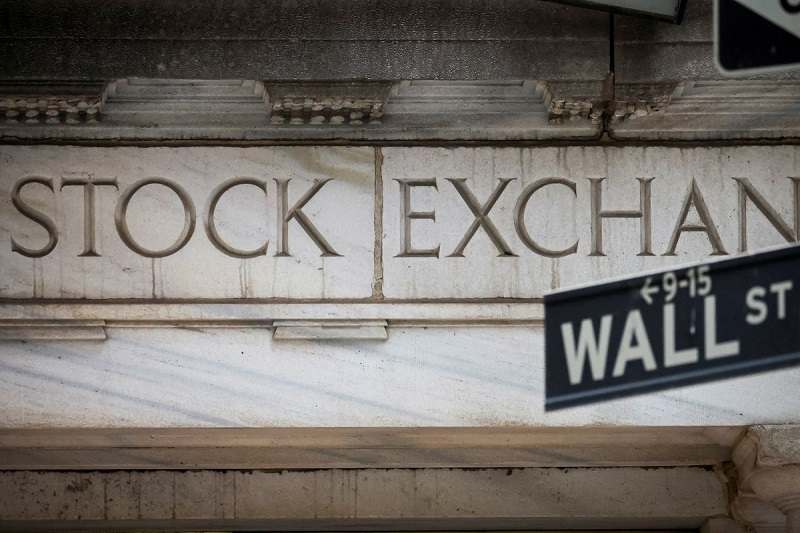
The Wall Street entrance to the New York Stock Exchange (NYSE) is seen in New York City, U.S., November 15, 2022.
14:52 JST, November 17, 2022
NEW YORK (Reuters) – Split control of the U.S. Congress following the midterm elections may provide a tailwind for stocks at the end of a bruising year, but inflation and the Federal Reserve are likely to remain the market’s main drivers, investors said.
Republicans were projected to win a majority in the House of Representatives on Wednesday, setting the stage for two years of divided government as President Joe Biden’s Democratic Party maintains control of the Senate.
“For the economy and markets it is policy that drives outcomes, rather than politics,” said Lauren Goodwin, economist and portfolio strategist at New York Life Investments. A split government “makes major policy changes unlikely, and that stability in policy tends to be reassuring for investors.”
Historically, stocks have done better under a split government when a Democrat is in the White House: Average annual S&P 500 .SPX returns have been 14% in a split Congress under a Democratic president, according to data since 1932 analyzed by RBC Capital Markets. That compares with 10% when Democrats controlled the presidency and Congress.
On a sector basis, a Democrat-led Senate may prove favorable for utilities, consumer discretionary and health care, as well as clean energy, wrote John Lynch, chief investment officer for Comerica Wealth Management, in a note published Tuesday.
Sectors whose recent performance may have been helped by expectations of a stronger showing by Republicans, including energy, biotech, financials and defense, may take a breather as investors reassess the degree of fiscal and regulatory advantages going forward, Lynch said.
A split government could stymie Democrats from pushing through several large fiscal packages, including $369 billion in spending on climate and energy policies and enacting a windfall tax on oil and gas companies, analysts at UBS Global Wealth Management wrote earlier this month.
Some worried that such spending could help buoy inflation at a time when the Fed has ramped up its monetary tightening to bring down consumer prices from their highest levels in decades.
On the other hand, gridlock comes with its own set of risks, including a possible standoff over raising the U.S. debt limit next year that could disrupt the economy at a point when Fed rates may still be at their peak.
While a split Congress may lessen the risks of a bruising debt ceiling fight, “We will sleep with one eye open,” said Goodwin, of New York Life Investments.
Still, macroeconomic concerns and monetary policy have driven markets all year, and investors believe that trend is unlikely to change anytime soon.
The S&P 500 is up more than 10% from its October low, with cooler-than-forecast inflation data last week and Tuesday’s producer price index results boosting hopes that the Fed could temper its rate hikes sooner than expected. The index is still down nearly 17% this year as of Wednesday’s close.
“Inflation matters more than anything else right now,” said Michael Antonelli, managing director and market strategist at Baird.
Indeed, fund managers polled from Nov. 4-10 in the latest survey from BofA Global Research cited inflation staying high as the market’s top “tail risk.” Read full story
Some investors are also counting on stocks to get a boost from seasonal trading patterns: November and December have tallied the second- and third-biggest average monthly percentage gains for the S&P 500 since 1950, according to the Stock Trader’s Almanac.
Much of that seasonality boost, however, may depend on whether the period falls within a bear market – defined as when stocks have fallen 20% or more from their most recent high.
In the last five instances when the November-December period occurred in a bear market, the S&P 500 logged an average two-month decline of 2.2%.
“When we talk about end of year being generally positive, that’s the case in bull markets. If you look at bear markets there is no evidence of seasonality at the end of the year,” Antonelli said.
Top Articles in News Services
-

Survey Shows False Election Info Perceived as True
-

Hong Kong Ex-Publisher Jimmy Lai’s Sentence Raises International Outcry as China Defends It
-

Japan’s Nikkei Stock Average Touches 58,000 as Yen, Jgbs Rally on Election Fallout (UPDATE 1)
-

Japan’s Nikkei Stock Average Falls as US-Iran Tensions Unsettle Investors (UPDATE 1)
-

Trump Names Former Federal Reserve Governor Warsh as the Next Fed Chair, Replacing Powell
JN ACCESS RANKING
-

Producer Behind Pop Group XG Arrested for Cocaine Possession
-

Japan PM Takaichi’s Cabinet Resigns en Masse
-

Man Infected with Measles Reportedly Dined at Restaurant in Tokyo Station
-

Israeli Ambassador to Japan Speaks about Japan’s Role in the Reconstruction of Gaza
-

Videos Plagiarized, Reposted with False Subtitles Claiming ‘Ryukyu Belongs to China’; Anti-China False Information Also Posted in Japan




















